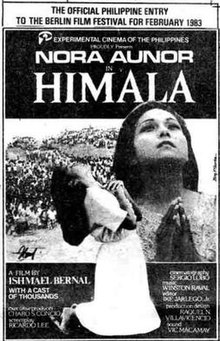| Himala | |
|---|---|
 Theatrical release poster | |
| Directed by | Ishmael Bernal |
| Screenplay by | Ricardo Lee |
| Story by | Ricardo Lee |
| Produced by |
|
| Starring | Nora Aunor |
| Cinematography | Sergio Lobo |
| Edited by | Ike Jarlego, Jr. |
| Music by | Winston Raval |
Production company | |
| Distributed by |
|
Release date |
|
Running time | 124 minutes |
| Country | Philippines |
| Language | Filipino |
| Budget | ₱3,000,000.00 (estimate) |
| Box office | ₱30,000,000.00 (estimate) |
Himala ('Miracle') is a 1982 Filipino film directed by Ishmael Bernal and produced by the Experimental Cinema of the Philippines. It stars Nora Aunor as a young woman living in the province who claims to have seen a Marian apparition. The film story and script written by Ricky Lee was inspired by a series of alleged Marian apparitions appearing before schoolgirls, which took place from 1966 to 1972 on Cabra Island in Lubang, Occidental Mindoro.[2][3]
The film premiered at the 1982 Metro Manila Film Festival, where it won Best Film and Best Actress for Aunor, among other awards. It then became the first Filipino film to be included in the Competition section of the Berlin International Film Festival. In 2012, on its 30th anniversary, Himala became the first film to be restored as part of the ABS-CBN Film Restoration Project, with a premiere at the 69th Venice International Film Festival as part of the Venice Classics section.
Although its initial release got rave reviews, Himala is now widely considered one of the greatest Filipino films of all time. Nora Aunor garnered worldwide popularity and is best known for her performance in the film as the purported seer and healer Elsa. Her portrayal is considered by most Filipino critics as one of the best of her career.[4] On November 11, 2008, Himala won the Viewer's Choice Award for the Best Film of All Time from the Asia-Pacific Region in the 2008 CNN Asia Pacific Screen Awards beating nine other films voted by thousands of film fans around the world.[5][6] The ten finalists were chosen by critics, industry insiders and actors.[4][7]
Himala was later adapted by Lee and Vincent A. de Jesus as a stage musical in 2003, which itself will be adapted into a film titled Isang Himala in 2024.[8][9][10]
- ^ Cite error: The named reference
Ricardowas invoked but never defined (see the help page). - ^ MiracleHunter, Inc. (2008). "Marian Apparition Claims of the 20th Century". The Miracle Hunter. Retrieved on March 28, 2011.
- ^ Pythias08 (November 27, 2008). "CNN Screening Room's feature on Himala". YouTube. Retrieved on March 28, 2011.
- ^ a b (2008-10-27). "Himala in CNN film poll" Archived September 17, 2012, at the Wayback Machine. Inquirer.net .Retrieved on March 28, 2011.
- ^ "Filipino film 'Himala' wins CNN APSA Viewer's Choice Award". CNN.com. Retrieved on March 28, 2011.
- ^ Dlanorsk5 (December 26, 2008). "Nora Aunor HIMALA as CNN Viewer Choice Award as Best Film in Asia-Pacific". YouTube. Retrieved on March 28, 2011.
- ^ Plaza, Gerry (November 12, 2008). inquirer.net, "CNN: ‘Himala’ best Asian film in history" Archived February 20, 2009, at the Wayback Machine. Inquirer.net. Retrieved on March 28, 2011.
- ^ Adobas, Dennis (August 12, 2003). ""Himala" ni Nora, tuloy sa CCP" [Nora's "Himala" to push through at the CCP]. Pilipino Star Ngayon (in Filipino). Philstar Global Corp. Retrieved August 1, 2024.
- ^ Llamas, Cory (November 3, 2003). "'Himala' gets stage makeover". Philippine Daily Inquirer. The Philippine Daily Inquirer, Inc. p. D1. Retrieved August 1, 2024.
- ^ Licsi, Ayie (July 16, 2024). "LIST: First batch of entries for 50th Metro Manila Film Festival". PhilSTAR Life. Philstar Global Corp. Retrieved August 1, 2024.